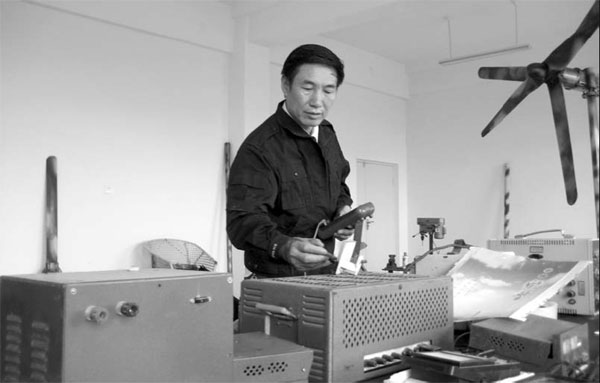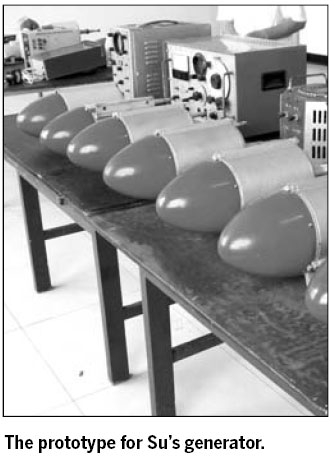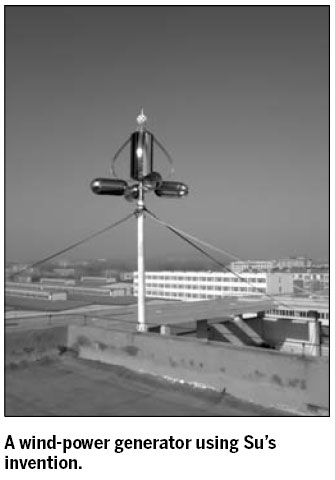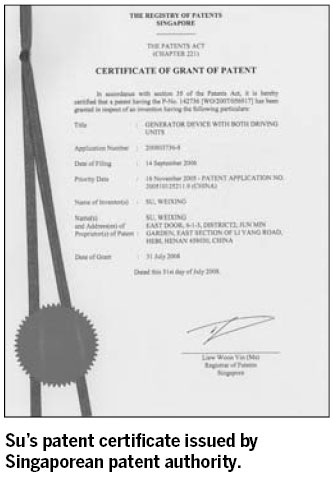|

Su Weixing amid his inventions. Photos Provided to China Daily
|
Su Weixing is a good example of an old Chinese saying - people with major accomplishments not only have outstanding intelligence but also unbendable perseverance.
Relying on his woefully inadequate knowledge of physics learned in high school, the one-time village factory worker in Henan province has created "revolutionary" power generating equipment.
He did it without advanced high-tech knowledge, money, laboratories or testing equipment.
His invention is considered "revolutionary" because it seemingly breaks a rule of physics and easily conjures up the image of crackpot science - the "perpetual-motion machine".
But it is not science fiction.
He has applied for invention patents on his "startling" power production device in some 100 countries and regions across the world and has now received authorization from eight including China, Singapore, Mongolia, South Africa and the Democratic People's Republic of Korea.
The English-language patent certificate terms the creation a "generator device with both driving units".
It has a generator, a control system, motor and a range of other mechanisms.
Su said his invention can produce more electricity than traditional designs by conserving mechanical energy.
"It will mean a lot for a country that has ever-increasing demand for energy and it also helps build a resource-saving society," he told China Daily.
He said the core is the generator design.
In a traditional generator, the stator stands still and a rotor runs to power the machine. Su's differs by having the stator and rotor both spinning, but in opposite directions.
Though improbable sounding, the technology has been verified by many experts from research institutions and universities including prestigious Tsinghua University.

Experts say just a 5 percent boost in the efficiency of a generator is considered a breakthrough, but Su's invention can bring a three-fold increase in output under the same conditions.
He said that is due to the dual-drive system that can produce faster rotation.
It can be employed in gas and wind turbines as well as generators powered by water and petroleum.
The invention has won a series of Chinese and international awards including gold medals from the Geneva International Patent Technology Fair and the 51st Eureka World Invention Fair.
It also attracted many foreign investors and businessmen who have tried to cooperate with Su since 2000. But the negotiations all failed because Su insisted that any resulting company must be headquartered at his hometown in Henan.
Tireless inventor
As he spent more than 10 years in research and innovation, Su said that with few reference materials, he had to fly by the seat of his pants.
Born in 1958, he has been wrapped up in inventions since early childhood.
After graduation from high school in 1976, he started to work in a village-run factory - at that time few people had the opportunity to go to college in China, especially in rural areas.
Su could not stop thinking about his concepts, so he sometimes asked for leave to work on invention.
Money was a big challenge.
"I earned less than 1 yuan a day working at the factory, which was far from enough," Su recalled. "So after careful consideration I quit the job and started my own business."
Since 1978, he successively established three electric appliance repair stores and a construction team specializing in water and electrical facilities.
But, the money he earned was still not enough to support his research. He was living beyond his means.
In 1980, he decided to close the stores, dismiss the teams and contract a brickyard in the village that could bring him more profits.
But knowledge was the third barrier to cross.
"I was learning while creating, but I had no guidance and also there were few resources in the village that could help me," said Su.
To trial and error and learn more, Su set up an electrical appliance and radio school in 1981 in cooperation with a State-run radio plant.
He also invested in a research institute in 1992 and an light bulb factory a year later.
Su contributed all his energy and earnings to inventions through those years.
The prolonged irregular life and fatigue sent him to the hospital in 1994 and he almost died. He was only 36 year old.
Recovering from sickness that cost almost all his savings, he was forced to stop his businesses.
But a truly brave man can bear what fate brings. Su braced himself again and improved the design of the prototype many times.
In addition, he is also carrying out research on another two related inventions.
Su said he could be a millionaire if he did not spend so much money on inventions, but does not regret his choices.
haonan@chinadaily.com.cn



(China Daily 07/10/2013 page17)





